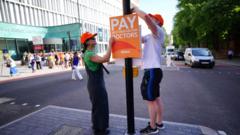Will the BMA Ever Accept a New Offer to End Doctor Strikes?

Published: 2025-11-05 20:00:15 | Category: technology
The British Medical Association (BMA) has recently rejected a new government proposal aimed at resolving the ongoing dispute with resident doctors in England. Health Secretary Wes Streeting's offer included covering exam fees and accelerating the expansion of training places, but the BMA argues that the proposal falls short, particularly regarding pay increases. This decision comes as resident doctors prepare for a five-day strike starting on 14 November, marking the 13th walkout since March 2023.
Last updated: 09 November 2023 (BST)
What’s happening now
The ongoing dispute between the BMA and the UK government remains unresolved as the BMA has declined an offer from Health Secretary Wes Streeting. The government’s proposal aimed to alleviate some financial burdens on resident doctors, including covering mandatory exam costs and increasing the number of training placements. However, the BMA insists that this is insufficient without a significant pay rise. This disagreement sets the stage for another round of strikes, which are expected to disrupt NHS services significantly.
Key takeaways
- The BMA rejected Health Secretary Wes Streeting's latest offer, citing inadequate pay increases.
- A five-day strike by resident doctors is scheduled to commence on 14 November 2023.
- The government plans to expand training places for doctors, increasing the total by 1,000 by next year.
Timeline: how we got here
The dispute has evolved over several months, particularly since the last strikes in March 2023. Key events include:
- March 2023: The first of multiple strikes by resident doctors begins.
- July 2023: Negotiations between the BMA and the government commence following ongoing industrial action.
- 9 November 2023: Streeting presents a new offer to the BMA, which is later rejected.
- 14 November 2023: The next round of strikes is set to begin.
What’s new vs what’s known
New today/this week
Health Secretary Wes Streeting's recent offer included covering exam fees and accelerating the expansion of training places. This proposal aims to alleviate some of the financial pressure on resident doctors, but it has been outright rejected by the BMA.
What was already established
Prior to this offer, the BMA had already expressed concerns regarding the pay of resident doctors, which they argue has not kept pace with inflation. Despite recent pay increases, doctors' salaries are reportedly still significantly lower than in 2008, when adjusted for inflation.
Impact for the UK
Consumers and households
Residents should prepare for significant disruptions in NHS services, particularly in hospitals, as nearly half of the medical workforce comprises resident doctors. This means potential delays in both emergency and routine care, with thousands of operations and appointments likely to be postponed.
Businesses and jobs
The strike will impact NHS staffing levels, with senior doctors stepping in to cover shifts. This may strain resources and compromise the quality of care delivered to patients during the strike period.
Policy and regulation
The government is under pressure to address the demands of the BMA, particularly regarding pay. The ongoing strikes may prompt further discussions about NHS funding and workforce management, with potential implications for future healthcare policies.
Numbers that matter
- 30,000+ applicants for 10,000 jobs: This year's application figures highlight the competitive nature of the medical training landscape.
- 1,000 new training places: The government plans to increase the number of training places available to resident doctors by 2024.
- 30% pay rise over three years: Resident doctors have seen pay increases, but the BMA argues these are insufficient in real terms.
Definitions and jargon buster
- BMA: British Medical Association, the professional association for doctors in the UK.
- Resident doctors: These are doctors in training, often referred to as junior doctors, who are in their early years of medical practice.
- NHS: National Health Service, the publicly funded healthcare system in the UK.
How to think about the next steps
Near term (0–4 weeks)
With the strike scheduled to begin on 14 November, individuals seeking medical care should be prepared for disruptions. The NHS is likely to cancel non-urgent appointments and procedures, impacting patient access to services.
Medium term (1–6 months)
The outcome of ongoing negotiations between the BMA and the government will be crucial in shaping the future of NHS staffing and resident doctors' pay. If no resolution is found, further strikes may occur, prolonging the instability in healthcare services.
Signals to watch
- Updates from the BMA regarding any changes to the planned strike dates.
- Government responses to the BMA’s demands and any new proposals that may arise.
- Patient access to services in the NHS and the impact of strikes on treatment schedules.
Practical guidance
Do
- Stay informed about the status of NHS services, particularly if you have upcoming appointments.
- Consider alternative healthcare options, such as private care, during strike periods.
Don’t
- Don’t ignore communications from the NHS regarding changes to your medical appointments.
- Don’t assume that all services will run as normal during strike actions.
Checklist
- Check your appointment status regularly leading up to the strike.
- Be prepared for potential rescheduling of treatments.
- Research alternative care options in case of significant disruptions.
Risks, caveats, and uncertainties
The situation remains fluid, with potential for changes as negotiations continue. The BMA's rejection of the government’s offer suggests a hardening of positions, and without a resolution, the NHS could face ongoing industrial action. Factors influencing outcomes include public sentiment, government responses, and the financial viability of proposed changes.
Bottom line
The ongoing dispute between the BMA and the government continues to pose significant challenges for the NHS and its workforce. With the next strike looming, the implications for patient care are substantial. Stakeholders will need to closely monitor developments in negotiations to understand the potential for future disruptions.
FAQs
What is the reason for the current strike by resident doctors?
The strike is primarily due to ongoing disputes over pay and working conditions. The BMA believes the government's recent offer does not adequately address the financial concerns of resident doctors.
How many strikes have occurred since March 2023?
There have been 12 strikes since March 2023, and the upcoming strike on 14 November will be the 13th.
What does the government offer include?
The government's offer includes covering exam fees and expanding training places for resident doctors, but the BMA states that it does not address the crucial issue of pay increases.



